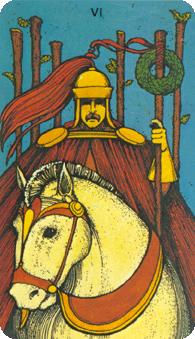6 0f Wands: Vigilance in Victory
(c) Cheryl Lynne Bradley 2005-7

There is no subjugation so perfect as that which keeps the appearance of freedom for in that way one captures volition itself.
Jean-Jacques Rousseau
Do not hold the delusion that your advancement is accomplished by crushing others.
Marcus Tullius Cicero
As I grow older, I pay less attention to what men say. I just watch what they do.
Andrew Carnegie
Those who cast the votes decide nothing. Those who count the votes decide everything.
Josef Stalin
The price of freedom is eternal vigilance.
Thomas Jefferson
"It is forbidden to kill; therefore all murderers are punished unless they kill in large numbers and to the sound of trumpets"
Voltaire
It has been said that at the end of every victory procession lies an open manhole. A gentle reminder not to get so caught up in celebrating a victory that you forget to watch where you are going. Sustained attention, or vigilance, refers to the state in which careful attention must be maintained over time. Usually this will manifest as a form of watchkeeping activity, wakefulness and circumspection.
The 6 of Wands in the Tarot is a card which speaks of a victorious celebration. A handsome Warrior King returning victorious from battle or perhaps he is leading his army into battle, riding a fine white horse and waving his banner. His head is held high, his aspect is confident. His eyes are on the prize and all eyes are upon him. An exuberant audience is there to applaud the moment. Everyone loves a parade or maybe they have to be there.
It makes one wonder about the active forces at work. Does he love what he is fighting for or hate what he is fighting against? Is he fighting for ideals, ideas, property, authority, love, or prestige? Does he hate to lose more than he loves to win? Is he the protector or the aggressor?
Nomadic tribes were great horsemen and horses were greatly revered. They were also essential for travel, conveying cargo, working the fields and as a vehicle of war. The white stallion had cult status among Hungarian nomadic tribes as the perfect incarnation of the horse. Leaders of the clans rode them. Upon the death of the leader, the horse was ritually slaughtered, partially consumed and then buried with the recently departed. It was an ancient British belief that the bravest of warriors were reincarnated as white stallions.
In ancient Rome the Equestrian class was one of the two upper classes. The Senatorial class had the aristocracy of Rank and the Equestrian class had the aristocracy of money. They were the knights and, therefore, the cavalry of early Roman state. The horse was supplied by the state if the soldier came from one of the senatorial families, which were wealthy and middle class. The state also provided money for upkeep. Ordinary citizens could become Equestrians when they achieved a personal fortune of 400,000 sesterces but they had to supply their own horse. These men were the young nobility. The office of Master of the Horse commanded the knights and fulfilled the orders of their leaders. The Master of the Horse was nominated from the highest ranking people, usually consular or praetorian, and had use of a horse. Roman leaders only had use of a horse at the command of the people.
A white stallion was also the most prized of gifts. In the late 800's and early 900's when Hungary was defeated by tribes from the east, a young Moravian Prince presented his conqueror with a clump of grass, a vial of water and a handful of dirt to symbolize the land he was surrendering. He was awarded a magnificent white stallion to certify the transfer of the lands. It was also offered to console and honour him, thereby taking away some of the sting of the humiliation of defeat.
It is not the critic who counts; not the man who points out
how the strong man stumbled, or where the doer of deeds
could have done better.The credit belongs to the man who is
actually in the arena; whose face is marred by dust and
sweat and blood; who strives valiantly; who errs and comes
short again and again; who knows the great enthusiasms, the
great devotions, and spends himself in a worthy cause; who
at the best knows in the end the triumph of high
achievement; and who at the worst,if he fails, at least
fails while daring greatly; so that his place shall never be
with those cold and timid souls who know neither victory nor defeat.
~Theodore Roosevelt
The horse is a Biblical symbol of warfare. "The horse is prepared against the day of battle; but safety is of the Lord." Proverbs 21:31. In Revelations 6:2 "And I saw, and behold a white horse: and he that sat on his had a bow; and a crown was given unto him: and he went forth conquering and to conquer." represents the transformation through Resurrection of Jesus from a human being who rode upon a humble ass, to a Spiritual King riding on a fine horse. In Revelations 3:21 Jesus says "To him that overcometh will I grant to sit with me in my throne, even as I also overcome, and am set down with my Father in his throne." This is a reference to the 144,000 spirit-anointed disciples who along with Jesus will rule the world after the Judgment Day.
In the Old Testament, Judges 1:6,7 "But Adonibezek fled; and they pursued after him, and caught him, and cut off his thumbs and his big toes. And Adonibezek said, three-score and ten kings having their thumbs and their great toes cut off, gathered their meat under my table; as I have done, so God hath requited me. And they brought him to Jerusalem and there he died.". The amputation of the thumbs and big toes would incapacitate a warrior or soldier for further military services. Without thumbs it would be impossible to handle a sword, spear or bow and the loss of the toes meant they couldn't balance themselves properly. A cruel example of vigilance in victory but at least lives were spared.
Carl Sagan offers some sage advice on the topic of vigilance, "Finding the occasional straw of truth awash in a great ocean of confusion and bamboozle requires intelligence, vigilance, dedication and courage. But if we don't practice these tough habits of thought, we cannot hope to solve the truly serious problems that face us -- and we risk becoming a nation of suckers, up for grabs by the next charlatan who comes along." We must also consider how those are treated who have been conquered, defeated, passed over or subdued and recognize the contribution of those who helped along the way. No riding a high horse, because as Shakespeare said, "Pride goeth before destruction and a haughty spirit goeth before a fall." We must continually be observant, and listen well, in order to monitor situations in which significant and unforeseen events may occur.
In closing, I will leave you with a quote from Sun Tzu which sums up the essence of vigilance in victory, " If you know the enemy and know yourself, you need not fear the result of a hundred battles. If you know yourself but not the enemy, for every victory gained you will also suffer a defeat. If you know neither the enemy nor yourself, you will succumb in every battle." Sometimes you can win the battle, but still lose the war. The answer may be in not loving what you are fighting for and in not hating what you are fighting against. Vigilance in victory becomes the key to winning the peace.

















